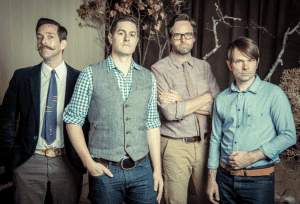Grammy award winning Dan Haseltine and 25 years of industry knowledge.

After years of being in the music industry you learn a few things. Things that only time or another seasoned musician could teach you. Think Bono. Think Yoda. I was involved in the music industry for 20 years and experienced the industry feelings of success, defeat, deceit and drama. The highlights of touring, the after show parties, and the meet and greets. The low lights of constant jet lag, band arguments and "not quite" making the charts that week.
Over the last fifteen years there has been enormous change to the industry's systems and methods. I sat down with multi grammy award winning Dan Haseltine to uncover some lead singer secrets. Not only as to changes in the industry but what he has learned. As a writer I'm always grasping for an interview that defies the fluff. Here's Dan's candid interview of the knowledge he's gained over the last 25 years. When 900 years old you are, would you know the industry this well?
Twenty-five years writing and performing music. But then you are the author of books and articles, a children’s book. Artistically speaking where, these days, are you hanging out? What mediums do you find to be the most rewarding if any?
The live music setting is very inspiring to me these days. I find myself equally mesmerized by a solo performance as I am by the spectacle of large production shows. I appreciate the showmanship and work that it takes to execute something on the live stage. The studio has become overstuffed with options and most of the records I hear sound very unfocused and disjointed. The sound palettes are startling and confusing. I love a great juxtaposition of sounds and textures, but it really takes discipline to find the right combination and let the rest of the oddities go. The live setting, although becoming less finite, still forces a level of focus that keeps bands and artists honest.
The stock in trade of the music industry tends to be defined in terms of musical accomplishments. Do you think that way?
No, as an artist I mostly just wanted to feel fulfilled and inspired by the act of making music. I have had conversations with popular and financially successful artists who were bored by what they had created, and were not proud of the cultural space they were in. I know what that feels like. It was hard to reconcile the cultural biases, and constructs that etched a path into a cultural space I didn’t want to be in. The money meant less than the awards, which meant less than the fans, who meant less than the accomplishment of writing a great honest and vulnerable song, which meant less to me than living up to the challenge of becoming a communicator and purveyor of meaning, purpose and the betterment of humanity.
Where do you find the emotional payoff in your music? What might you say your most satisfying accomplishment is?
The most satisfying accomplishments happened when I found a great lyric in the recesses of my mind, or found a way to move a song idea forward. The magic of stepping into a room teeming with ideas and pluck the right ones that fit together to form a song will never get old. And then to build that song in the studio and hear it all for the first time once it is mixed and mastered is quite satisfying.
What is the greatest personal jeopardy you see for someone trying to “make it” in music today? What advice would you offer?
I would say that the mindset of entering the music profession with a desire to “make it,” is the wrong starting line. The very identity of an artist hangs in the balance based on the economy of success they decide to pay attention to the most. If the most influential motivator is to become popular, which is, paradoxically, the loneliest form of existence, than it requires artists to express surface level sentiments in their art, which tend to be both disposable and unsatisfying. People engage pop music at a 3rd grade reading level. I’m not saying that a good pop song is easy to write. There is definitely a discipline and craft to it. But even pop music songwriters are not starting with the core motivation of popularity, but rather from a motivation to write something meaningful that is communicated in a simple way. The only motivation that gives everyone the satisfaction from the listener to the creator, is the one that begins with simply wanting to be masterful at the craft they wish to have as an occupation.
What was a staple in the music industry 25 years ago that you wish we still had now and what do we have now that you wish you could have had access to in the beginning of your career?
I never appreciated it as a young artist, but a really great A&R guy helping an artist develop is priceless. I will play the “back in my day card” simply because you asked. Most artists today describe their music as innovative and unique. I just call it untethered and naïve. Music has roots whether we want it to or not. There is a soul to music that we either invite in or shut out. Craftsmanship is born out of a rootedness to the beginnings of musical style, tone, melody, rhythm..etc. It is easy to fabricate an old texture or steal a noise from some other era of music, but without understanding the roots of where those tones came from, artists end up making caricatures and not new vital works. A good A&R guy should be twice as old as the artist they are working with. Everyone in the music industry is young and super hipster, and they listen to vinyl because its cool, and they haven’t the slightest clue where the music they are attempting to guide and serve came from. They don’t know an artist’s influence’s influences. So the music is disposable and it lacks a soul. I wish we had great A&R today.
I love ProTools and Logic, and the ease with which we can record and multitrack and get things sounding good is amazing. And my temptation to answer the question about what I wish I had is to say all this technology, but I don’t really think that would be true for me. I’d probably move back to the live environment with my answer. I wish we had access to the kind of sound and light production they have today. I remember bringing multiple semi-trucks with massive speaker cabinets stacked up. You can fill half a trailer with a production rig that is 10X louder and much better sounding. Cellphones would’ve been nice also.

What do you see as the most drastic change in the music industry in the last 25 years?
The most drastic change in the music industry has come from the invention of digital recording. Everything else has been a response to the accessibility of low cost high quality recording options. Anyone can record a track and sing a vocal and make it sound professional. Most of it is not good, but that doesn’t matter anymore because there is so much of it that we make music for tribes and not for universal audiences anymore. The digital recording mediums gave way to the digital formats that could be shared and downloaded, and that meant that music delivery could be fast and widespread. It also meant the growth of music genres especially hip-hop, rap, and electronic music. Digital recording changed nearly everything. Except a great song is still a great song and a crappy song is still a crappy song.
What advice would you give to band members as to how they can best say as a united team and avoid the classic band break up?
The best advice I can give to band members to avoid disunity is to stop touring. That isn’t realistic advice for most. The common reasons bands break up is money or interpersonal relationships. The answer to both is to be generous. I have watched quite a few bands struggle because they have a song that gains traction and starts making money and there is only one guy who has the publishing for it. Everyone is slogging it out on the road supporting the music and only one guy is going home to royalty checks and a better lifestyle. If a band is truly a band, then there are ways of bringing all members into sharing in the success and failure of that band.
If the reasons are interpersonal in nature, its harder to deal with. Touring life is arrested development. I was able to be 19 years old for 20 years. But at some point everyone needs to grow up. Most touring bands are young and they don’t have enough life experience or time in mature relationships to know how to deal with conflict or tension or even just the varied way others handle pressure. Everyone is dealing with a lot of crap in real time and that requires a lot of grace, humility, and respect for people’s processes. There are probably volumes to write about this dynamic. But ultimately, most bands don't break up because of a stupid guitar part or botched lyric during a show… its usually something more than those things.





